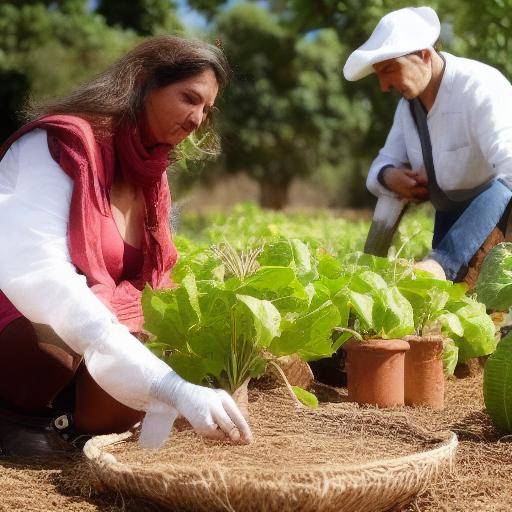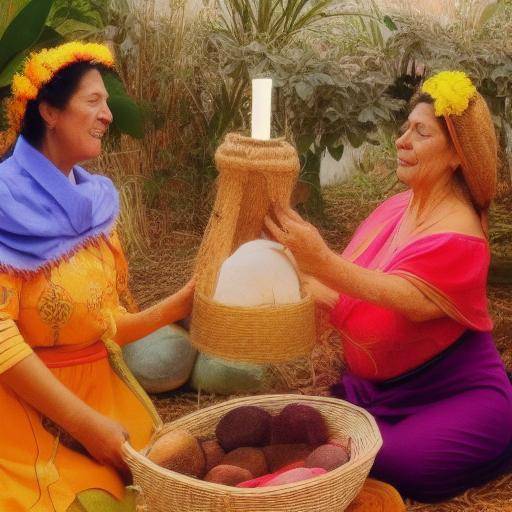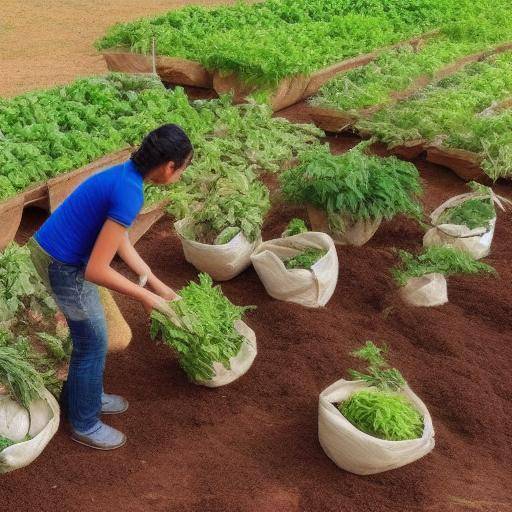
Introduction
The relationship between fertility rituals and agriculture has been a crucial element in cultures around the world throughout history. Since ancient times, communities have used rituals and ceremonies to invoke the fertility of the earth and ensure prosperous harvests. In this article, we will explore the deep connection between these rituals and agriculture, examining their historical importance, their contemporary implications and their influence in modern society.
History and Background
Fertility rituals have deep roots in the agricultural traditions of various civilizations throughout history. In many ancient cultures, such as Greek and Roman, rituals were held to honor deities associated with fertility, such as Deméter and Ceres. These ceremonies symbolized the renewal of the earth and sought to ensure the abundance of crops.
In ancient Egypt, rituals were performed to invoke the annual flooding of the Nile River, which was fundamental to the fertility of the earth. These rituals included dances, offerings and religious ceremonies in honor of the gods of the water. In Latin America, pre-Columbian cultures, such as Aztecs and Incas, also practiced fertility rituals and related their agricultural cycles to the influence of their deities.
Fertility rituals continued to play a significant role throughout the Middle Ages and the Modern Ages. In Europe, the festivities associated with spring, such as the celebration of Easter, incorporated elements of pagan fertility rituals. In addition, rural communities held ceremonies to bless the fields and promote crop growth.
Analysis in Deep
While fertility rituals are rooted in history, their contemporary relevance remains significant in many regions of the world. In modern agriculture, rituals and festivals remain a common practice in some countries. These traditions can range from religious ceremonies to civic events involving the entire community.
Despite technological advances in agriculture, the connection between fertility rituals and agricultural practice still persists. In some cases, farmers continue to perform rituals to honor land and seek protection against natural disasters. These rituals often promote a sense of community and cultural heritage, strengthening bonds between generations and fostering the preservation of ancestral traditions.
Comprehensive review
In addition to its cultural importance, fertility rituals have practical implications in agriculture. Some studies have shown that performing rituals can have a positive impact on farmers' attitude towards their work, which can influence crop productivity and care. Likewise, the psychological dimension of rituals can play a role in the management of stress and uncertainty inherent in agriculture.
On the other hand, there are criticisms and challenges associated with the relationship between fertility rituals and agriculture. Some argue that dependence on rituals can perpetuate superstitious beliefs that have no scientific basis. In addition, in a context of industrialized agriculture, ritual practice can be seen as a relic of the past that hinders the adoption of modern and efficient methods.
Comparative analysis
In examining the relationship between agriculture and fertility rituals, it is important to consider how these practices are intertwined in different cultural contexts. While some countries keep their traditions of agricultural ritual alive, in other regions these practices have decreased or evolved to adapt to social and economic changes.
In some rural communities, the realization of fertility rituals remains an essential part of agricultural life, while in urban environments or in highly industrialized regions, such practices may have lost their relevance. This divergence reflects the complexities of the interaction between culture, tradition and the evolution of agricultural practices in different parts of the world.
Practical Tips and Accessible Recommendations
If you are interested in incorporating the tradition of fertility rituals in your agricultural practice, consider the following:
- Investigate the traditions and rituals associated with agriculture in your region.
- Connect with farmers and community members to understand the importance of rituals in agricultural practice.
- Consider performing simple ceremonies or rituals that promote a sense of connection with the earth and nature.
- Explore how traditional practices and rituals can coexist with modern agricultural management approaches.
Ideas and Industry Reviews
In consulting experts in agriculture and anthropology, the importance of understanding the heterogeneity of agricultural practices in relation to fertility rituals is emphasized. Some experts argue that these traditions reveal a profound connection between humanity and earth, which transcends the mere utilitarian and economical.
On the other hand, there are opinions that question the effectiveness of fertility rituals in the context of modern agriculture, emphasizing the need to adopt approaches based on scientific evidence and advanced technology. However, the majority agree that the preservation of agricultural traditions, including rituals, is important for the cultural diversity and identity of rural communities around the world.
Case Studies and Practical Applications
An outstanding example of the influence of fertility rituals in contemporary agriculture is found in the region of Italy known as Campania. There, farmers perform the "Feria de las Brujas" to honor the goddess Ceres and guarantee the fertility of the land. This festival keeps alive an ancestral tradition that merges pagan and Christian elements, demonstrating the continuity of ritual practices in agriculture.
In contrast, in countries like Japan, some fertility ceremonies have evolved into more symbolic and aesthetic expressions, merging traditions with contemporary culture. These examples illustrate how fertility rituals continue to influence agriculture in diverse and changing ways around the world.
Future Trends and Predictions
As agriculture continues to evolve, the relationship between fertility rituals and agricultural practice is likely to undergo significant changes. As awareness of the importance of the preservation of cultural traditions increases, fertility rituals may be revalued as an integral part of the agricultural heritage of communities.
However, the influence of technology and globalization can also influence how fertility rituals are integrated into agricultural practices. New ways of synchronizing ancestral traditions with the demands and challenges of contemporary agriculture are likely to emerge, which could lead to a new expression of fertility rituals in the future.
Conclusion
Fertility rituals and their relationship with agriculture represent a fascinating interlacing of culture, tradition and agricultural practice. Throughout history, these rituals have been a constant in the lives of many communities, providing not only practical benefits, but also a human and spiritual connection to the earth.
In considering fertility rituals, it is important to recognize its diversity, complexity and ability to evolve and adapt to cultural and technological changes. Regardless of individual perspectives on the effectiveness of such rituals, their influence on agriculture remains a subject of great interest and importance. As we move forward to the future, it is crucial to continue exploring and discussing the role of fertility rituals in agriculture, recognizing its value both culturally and practically.
Frequently asked questions
What role do fertility rituals play in current agriculture?
Fertility rituals can play various roles in agriculture, from fostering community cohesion to providing a sense of connection with land and nature. In addition, in some communities, these rituals are considered to have a positive impact on the psychological well-being of farmers and their attitude towards agricultural work.
Are there scientific studies that support the effectiveness of fertility rituals in agriculture?
While scientific evidence may be limited, some studies have explored the psychological and social effects of rituals in agriculture. These studies indicate that rituals can influence the attitude of farmers and promote a sense of cultural identity in agricultural communities.
How have fertility rituals evolved in the context of modern agriculture?
In many cases, fertility rituals have evolved to adapt to social and economic transformations. Some communities have merged ancestral traditions with contemporary expressions, while others have preserved more traditional rituals as part of their cultural and agricultural heritage.
What is the role of fertility rituals in agricultural sustainability?
Fertility rituals can play a role in promoting agricultural sustainability by fostering crop practices that respect and honor land. In addition, these rituals can strengthen community cohesion and promote values of environmental and cultural responsibility in agricultural practice.
What impact do fertility rituals have on agricultural risk management?
Some advocates of fertility rituals argue that they can contribute to agricultural risk management by promoting a mindset of respect and care for land. In this sense, rituals can be seen as a way of mitigating the negative impacts of natural events and challenges related to agriculture.
How can farmers integrate fertility ritual traditions with modern agricultural management approaches?
The integration of fertility rituals with modern agricultural management approaches can take place through an approach to respecting and assessing cultural diversity. Farmers can incorporate ritual traditions flexibly, recognizing their importance in the cultural and community context, while adopting modern methods based on scientific evidence.
In short, fertility rituals are intrinsically linked to agriculture, both in the historical and current spheres. Understanding these practices, their evolution and their impact on agricultural communities is essential for a deeper appreciation of the interrelationship between culture, tradition and agricultural practice.












